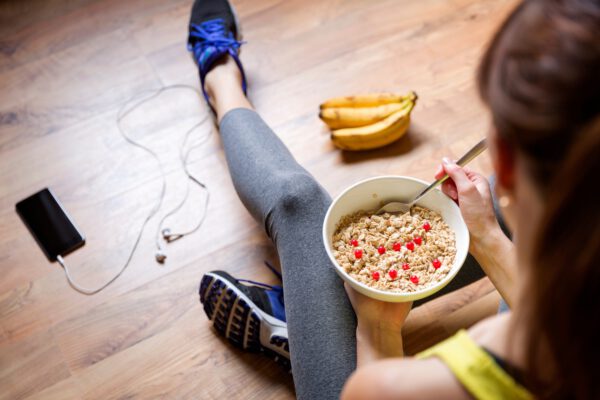How Meal Timing Affects Your Results
We all know how important food is to our health and fitness results. To get quality results, we have to put in quality fuel. What many don’t fully appreciate, though, is the importance of meal timing. While when you eat is not as important as what you eat, it comes pretty close!
In this article, we explore the ideal meal timing for maximum training results.
Before you zone in on the timing of your meals, you need to first ensure that you are eating the right foods in the right amounts. That includes not skipping meals and not overindulging on the weekends. You need to find an eating plan that balances your macro and micronutrients and that you can stick with over the long term. Once you’ve got that sorted, then you can start thinking about nutrient timing.
The concept of meal timing comes from the world of athletics. A number of studies have been conducted on the ideal nutrient timing for optimal training and sports performance. From such research, general guidelines have been developed on what to eat before, during, and after exercise sessions for optimal performance.
The basics of nutrient timing revolve around eating your carbs close to your training session. This will fuel your body to provide the energy you need to train. Taking in carbs after your workout, will replace the glycogen you have used up during the workout and fuel your muscles for recovery.
But these protocols will not promote fat loss if you are not in a calorie deficit at the end of the day! So, if you are working out to lose weight, be sure to apply the suggestions that follow in line with your calorie goals (i.e. maintaining a daily caloric deficit where you are eating 250-500 calories below your maintenance level).
The purpose of eating before a workout is to fuel your body with an ample supply of energy to power you through the training session. To do this you should eat a combination of protein and medium glycemic carbohydrate foods about 90 minutes before your workout. This combination will top off your muscle’s glycogen stores while also helping to preserve muscle mass during the workout.
You should not eat fat-containing foods prior to your workout. That’s because fats are slow to digest, leaving many people feeling lethargic and sluggish. That’s the last thing that you want going into a workout.
About twenty minutes before starting your workout, you should consume a fast-acting carbohydrate source to provide you with an extra energy boost. The classic example is a banana.
Some people choose to take a pre-workout drink before their workout. This is a blend of natural compounds designed to boost energy and improve mental focus during the workout.
Pre-workouts can help to improve workout performance but are not as important as timing your whole foods meals as advised. Here’s a recap …
- 90-minutes before the workout eat a 50/50 protein-carb meal (example; chicken breast with sweet potato)
- 20 minutes before the workout eat a fast-acting form of carbohydrate (example; banana)
A workout you have to try:
During your workout, your body will be operating off the foods that you’ve put into your body 90-minutes before your workout. It doesn’t need extra calories while you’re training. But it does need hydration. Maintaining your water intake during your training session will keep the muscle cells full while also replacing the water that you lose through sweating.
As you sweat you lose electrolytes along with water. These are essential to the contracting and flexing of your muscles. To replace those lost electrolytes, you should sip from an electrolyte-infused H2O drink as you go through the workout.
Once your workout is over, your body will be depleted of glycogen, which is the main source of energy that fueled your training. To replace this glycogen you need to take in carbs. Any carbs you eat after a hard workout will go directly into the muscle cell to replace that lost glycogen.
If you have a sweet tooth, you can get away with a small portion of sugary food within an hour of your workout. That could be a small blueberry muffin or a few squares of chocolate.
By planning your sweet treat directly after your workout, you may find it easier to stick to your diet - just be sure to limit your portion!
You also have a need for protein after your workout. This will help to repair the muscle tissue that has been damaged during your workout. You should consume 20-30 grams of protein in the hour after your workout. You can get this either from whole foods or from a protein powder.
There is quite a lot of debate about whether or not you should eat before bed. There is research to support both views. If you suffer from acid reflux, you should not eat within three hours of going to bed. Eating anything but a snack before bed can stimulate the digestive process which can, in turn, make it hard to fall asleep.
While there is some evidence that eating a large meal before bed can lead to weight gain, there is no research to support the view that a healthy, small snack will make you fatter. In fact, it may help you to enjoy better sleep. Rather than eating traditional dessert foods, opt for a protein and fiber-rich snack. My favorite is a small bowl containing diced cheese, apple slices, and walnuts.
The timing of your meals has a big impact on your exercise performance, recovery and results. You should focus on whole foods as opposed to supplements. Before your workout, take in a 50/50 blend of medium-acting carbs and protein. While you’re exercising stay hydrated with an electrolyte-enhanced H2O drink. Then, within an hour of your training session, restore your glycogen levels with some fast-acting carbs. You should also consume 20-30 grams of protein after your workout to provide the amino acids to rebuild your muscles.
Frequently Asked Questions
Meal timing plays a crucial role in optimizing energy levels and recovery. Eating the right nutrients at the right times can enhance performance, support muscle recovery, and help achieve fitness goals more effectively.
Consume a combination of protein and medium glycemic carbohydrates about 90 minutes before your workout to fuel your muscles and preserve muscle mass. Avoid high-fat foods as they can slow digestion and make you feel sluggish.
While meal timing can optimize performance and recovery, fat loss ultimately depends on maintaining a calorie deficit. Ensure your meal timing aligns with your caloric goals to support weight loss.
Eating after a workout helps replenish glycogen stores and aids muscle recovery. Consuming carbs and protein soon after exercising can maximize recovery benefits, but the exact timing may vary based on individual goals.
Yes, meal timing can affect mental clarity and focus. Eating balanced meals at regular intervals helps maintain stable energy levels, which can enhance cognitive function and overall mental well-being.
Opt for medium glycemic carbohydrates like oats or whole grain bread, which provide sustained energy. For a quick boost, consider fast-acting carbs like a banana shortly before your workout.
For a detailed understanding of macronutrients and their impact on fitness, check out What Are Macronutrients? A Simple Guide To Nutrition.

